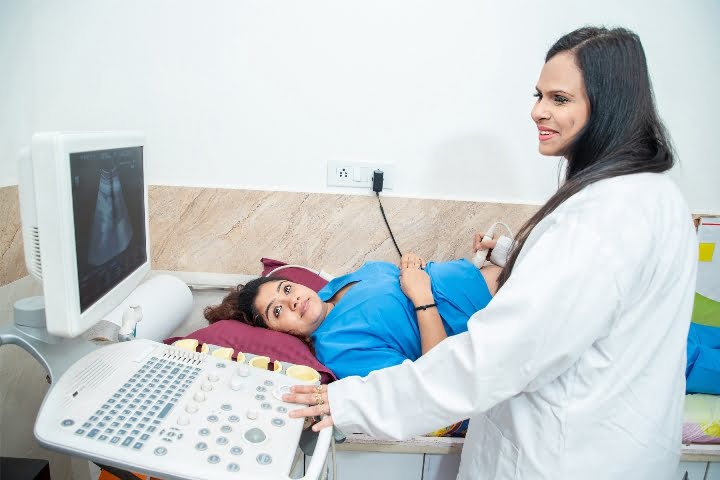
Kidney diseases are a significant health concern that can affect individuals of all ages. From conditions like kidney stones to chronic kidney disease (CKD) and kidney infections, the kidneys' health is crucial for overall well-being. Detecting these conditions early is key to preventing severe complications. One of the most widely used and effective diagnostic tools for kidney diseases is sonography, or ultrasound. At Diagnopein, we offer advanced sonography services, including USG abdomen and pelvis scans, to help detect and monitor kidney diseases accurately.
Sonography is a medical imaging technique that uses high-frequency sound waves to create images of the inside of the body. Unlike X-rays or CT scans, sonography is non-invasive and does not involve radiation, making it a safe option for frequent monitoring of kidney conditions. It’s widely used to assess the structure of the kidneys, detect abnormalities, and guide the treatment process.

1] Detection of Kidney Stones - Kidney stones are one of the most common kidney problems that affect millions of people worldwide. These stones are hard deposits of minerals and salts that form inside the kidneys and can cause significant pain, especially when they move or block urine flow.
Kidney stone sonography is a reliable and widely used diagnostic tool for identifying kidney stones. It helps doctors visualize the size, location, and number of stones, which are essential for deciding the treatment plan. Unlike other imaging techniques, sonography does not involve radiation, making it a safer and more convenient option for patients, especially when regular monitoring is needed.
If you're experiencing symptoms like severe back pain, painful urination, or blood in your urine, you might need a sonography test near me to detect kidney stones. Early detection allows for timely intervention, such as medication, lifestyle changes, or in some cases, surgical procedures.
2] Assessing Kidney Size and Function - Sonography is also used to evaluate the size and structure of the kidneys. Changes in kidney size can be a sign of various kidney conditions, including chronic kidney disease (CKD) or polycystic kidney disease.
In cases of CKD, for instance, sonography can help doctors track the progression of the disease by measuring the kidneys' size and detecting any damage or scarring. Regular USG abdomen and pelvis scans are crucial in managing CKD as they provide ongoing insight into how the kidneys are functioning. Sonography is also effective in diagnosing kidney conditions in their early stages, allowing for more effective treatment and better management of kidney function.
3] Detecting Tumors or Cysts - Another critical use of sonography is in detecting kidney cysts and tumors. Kidney cysts are fluid-filled sacs that form in the kidneys and are typically benign. However, larger cysts can sometimes cause discomfort or complications. Sonography provides real-time imaging, allowing doctors to monitor the size and condition of kidney cysts.
Kidney tumors, while less common, can be detected using sonography as well. Early detection is crucial because timely intervention can prevent further damage and improve the chances of successful treatment. Sonography helps distinguish between benign cysts and malignant tumors, guiding doctors in making the appropriate diagnosis and treatment decisions.
4] Monitoring Kidney Infections- Kidney infections, also known as pyelonephritis, occur when bacteria spread to the kidneys, often from a urinary tract infection (UTI). Kidney infections can lead to serious complications, including kidney damage if not treated promptly.
Sonography plays a vital role in assessing the extent of the infection. It can reveal signs of inflammation, swelling, or abscesses in the kidneys, helping doctors evaluate the severity of the infection. For patients with recurrent kidney infections, sonography near me is an excellent tool for ongoing monitoring to ensure no long-term damage is done to the kidneys.
5] Evaluating Blood Flow to the Kidneys - Sonography can also be used to evaluate renal blood flow, which is vital for kidney function. Reduced blood flow to the kidneys can lead to kidney damage and may be associated with conditions like hypertension or diabetes. Doppler sonography, a specialized form of ultrasound, assesses the blood circulation to the kidneys by measuring the speed and direction of blood flow.
Monitoring renal blood flow is essential for preventing kidney failure and managing conditions that could affect kidney function over time. Regular sonography tests near me provide important information for doctors to manage and treat underlying health issues that may impact the kidneys.
A] Non-Invasive and Safe - One of the primary benefits of sonography is that it is non-invasive. Unlike other imaging techniques, it does not involve radiation exposure, making it safer for repeated use, especially in patients who require regular monitoring.
B] Quick and Efficient - Sonography tests are typically quick, often taking less than 30 minutes. This efficiency, combined with the immediate availability of results, allows for prompt decision-making in the management of kidney diseases.
C] Widely Available - With the prevalence of sonography centers, finding a sonography centre near me is convenient for most patients. This accessibility ensures that individuals can receive timely assessments and interventions, which is crucial for effective kidney disease management.